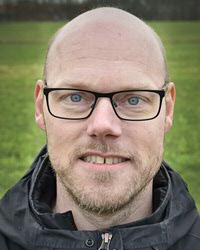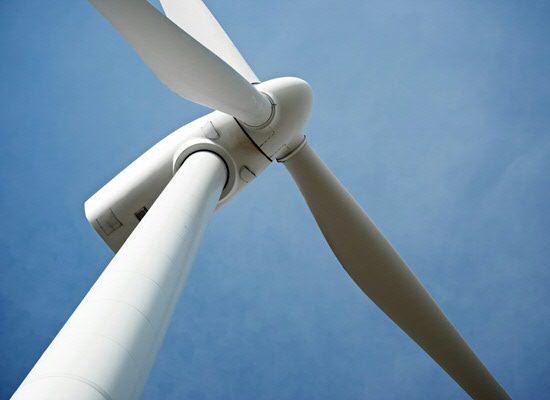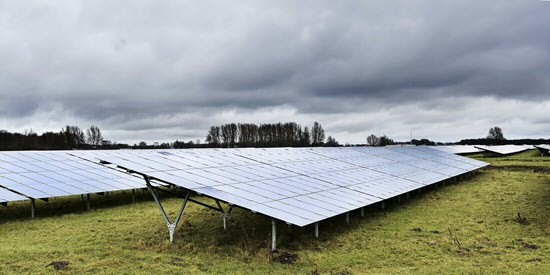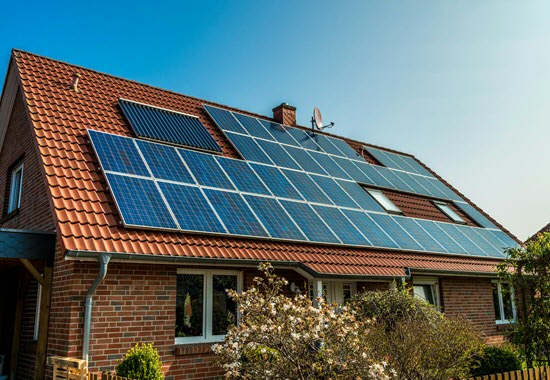The energy transition can be nice, if you’re smart about it!

All is quiet in the Mercator Building, the home base for the Faculty of Spatial Sciences. On the third floor, we see portraits of former professors, including Henk Voogd, the first professor of spatial planning and design, who would have undoubtedly loved to have taken on the issues associated with climate adaptation and the energy transition. Climate adaptation will be addressed extensively during the Climate Adaptation Week, which will take place from 19 to 25 January 2021 in Groningen. Christian Zuidema is working on the energy transition and its consequences for humans and the landscape.
Text: Martin Althof, Communication UG, Photos: Elmer Spaargaren
Originally from Hoogeveen, Christian Zuidema belonged to the first class of spatial planners and designers in Groningen. He began his studies in 1997. ‘Geographers want to know how the world is put together from a spatial perspective. Spatial planners and designers go a step further—they want to achieve change as well. They are more pragmatic, looking for tools that they can use to intervene. This is exactly what is needed in the energy transition process.’
The Netherlands in the slow lane
The energy transition from fossil fuels to renewable energy sources is necessary and irrevocable. Zuidema has noted that the Netherlands is firmly situated in Europe’s slow lane. At present, only a little more than seven percent of the country’s energy comes from renewable sources: solar, wind and biomass. This can be explained in part by the abundance of natural gas in our country. Other countries had to start searching for alternatives much earlier. Zuidema continues: ‘In addition, the availability of clean, inexpensive gas attracted the highly energy-intensive chemical industry to areas like Delfzijl. Even though natural gas is currently on its way out, the chemical industry remains, and it is responsible for a small fraction of the total demand for energy in the Netherlands’.

Denmark
Denmark is often regarded as a shining example. The country is already producing 36% of its energy from renewable sources. That is certainly impressive. Zuidema nevertheless points out an important detail: ‘Denmark has about the same surface area as the Netherlands, and the two countries produce about the same amount of energy from renewable sources. At the same time, however, Denmark has only six million inhabitants and little, if any, heavy chemical industry. In a nutshell, the total need for energy is much lower. Per square kilometre, we generate just as much renewable energy as Denmark does—but we need much more in an area that is used much more intensively. This shows that space is essential for the energy transition. That being said, Denmark was indeed earlier and smarter in starting the transition to wind energy. As a result, we are now importing wind turbines from Denmark’.

Advantages for the local community
In recent years, considerable attention has been focused on the negative aspects of windmills: noise pollution, landscape violation and substantial night-time light production. ‘It’s not nice, but it’s necessary.’ That was the message that the Dutch government conveyed about windmills for a long time. Zuidema continues: ‘The conversation focused largely on the number of megawatts, but local residents felt a sense of injustice: all costs and no benefits. In my opinion, it is important to provide a clear overview of what wind and solar projects can mean to the local community. Windmills that generate energy could also offer a tool for enhancing the quality of life in a region. This could be done by making investments in the living environment, or by returning a portion of the proceeds to the local residents. The energy transition also has something to offer to citizens, but it does require a smart approach. The basic idea is to position the advantages where people currently perceive disadvantages. This is not always easy, but examples like the Solar Park in Glimmen and the Krammer Wind Park in Zeeland show that there is a lot of potential’.
Fighting energy poverty
The Dutch government using subsidies to promote the energy transition. All residents of the Netherlands contribute to these subsidies through energy tax. Zuidema continues: ‘I’ve been able to minimise those energy costs by investing in solar panels on the roof of my home. Not everyone can do that. Those who can’t afford it will continue paying energy taxes and subsidizing a limited group of people who are able to do it. Large companies, often from outside the country, also profit from these stimulus measures’. In the European ‘Making City’ project, Zuidema investigated energy poverty, which is also emphatically present in Groningen. ‘People are not able to pay their energy bills. But the costs could be lower - obviously by paying more attention to insulation, but also by sharing in the proceeds of the renewable energy sources that have been achieved. We should make sure that citizens who are not able to invest will be able to profit from these proceeds as well. This would allow them to invest their way out of the world of fossil fuels and taxes. Although this is crucial to achieving our energy goals, it is perhaps even more important as a way of acknowledging their interests - of allowing them to participate. Imposing things from above often turns out to be counter-productive’.

Hail
In a November interview in newspaper De Volkskrant, governmental landscape consultant Berno Strootman, expressed concerns about the lack of direction in the energy transition. According to Strootman, if The Hague does not take control soon, the Netherlands will turn into ‘one big pile of confetti’—a clutter of windmills and solar parks. Strootman advocates for a Minister of Spatial Affairs, who should have the budget and powers needed to weigh the various interests against each other. Zuidema agrees: ‘We lack an over-arching vision and a framework. Although 30 regions prepare their own separate Regional Energy Strategies, they are often no more than collections of existing initiatives. In many cases, these plans do not comprise any strategic vision on how the energy transition should be addressed in combination with such issues as mobility, agriculture or the housing market. After all, truly integrated operations are difficult. Many governments are likely to remain bogged down in rules and covenants, with each sector focusing on its own interests. Broader thinking is needed. The energy transition is inherently an integrated phenomenon. A powerful vision can be a big help in this regard’.
The energy sector and spatial planning
The energy sector and spatial planning will ultimately have to learn to cooperate with each other. Zuidema argues that this will simply require time: ‘Energy companies have a clear goal - to generate energy. From the start, they have been less concerned with spatial consequences. For their part, urban planners have not always been interested in energy. This is because, in the past, energy was taken for granted, and it was not taken into consideration with regard to the landscape. Moreover, legislation and regulations have tended to lag behind. What exactly is a solar panel? Where can they be installed? What is the maximum allowable height for a windmill? What is the maximum distance from built areas? Under which conditions is compensation an issue? What do we do with geothermal energy or heat networks? Although we are learning very quickly, we are far from having it all figured out’.
Do we want data centres?
Zuidema re-emphasizes that we must keep going with the transition. Regardless of what we might do, there will always be ten percent in opposition. In our democratic system, the decision will ultimately be taken by majority vote in the House of Representatives, the Provincial Council or the Municipal Council, with the opportunity for testing by the courts. He nevertheless adds:, ‘We must remain highly critical with regard to the question of how. Where should the windmills be installed? On land, or primarily at sea? Should good agricultural land be allocated for solar parks at a time when we are also striving to achieve extensive organic agriculture? Are energy guzzlers like aluminium smelters and data centres welcome or unwelcome in the Netherlands? The success of the energy transition also depends on conscious coping with developments in the need for energy’. In Zuidema’s opinion, the main point cannot be expressed by focusing solely on megawatts or megajoules: ‘What can an energy transition mean for an area? How can it add value, and what kind of value can be added to the transition from that area? Not until we can answer these questions will we will have a transition that will also mean something to local residents and the economy’.
Meer informatie
More news
-
01 December 2025
The power of movement
